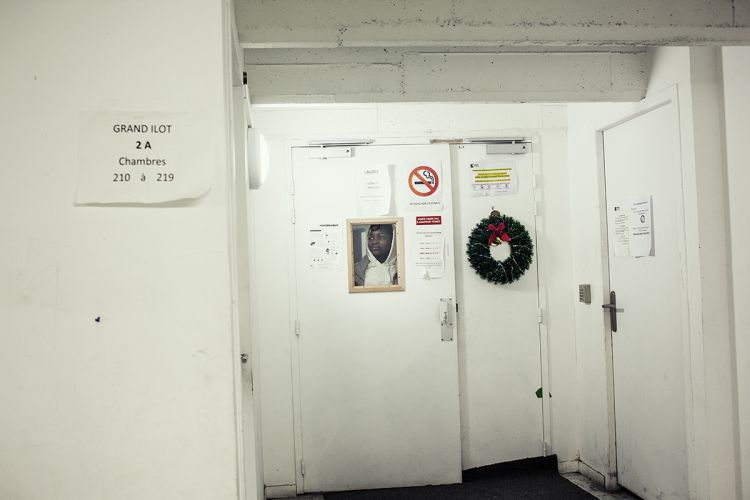Ici, d’ailleurs
-
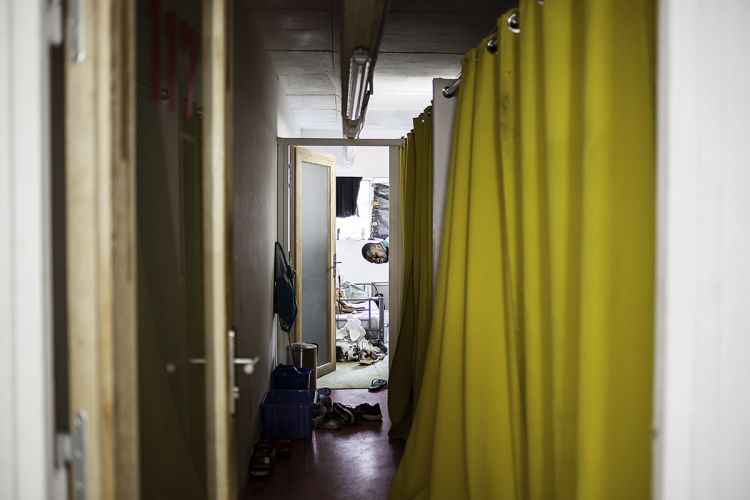

During my presence at the center, I am accompanied by social workers who ensure that health standards are respected. Thanks to their complicity and the bond that I was able to create with the residents, I manage a safe and intimate environment based on trust and respect.
Considering the sanitary restrictions, the difficulties of documenting these spaces and the stand-by of artistic and cultural proposals,” Ici, d’ailleurs” takes a unique turn.
Exploring the places, i met all the participants. 17 people will play the game of getting out of its 4 walls m2, 17 people will play the game of getting out of its 4 walls, far from respecting the surface stipulated by law as criteria for decent housing. To my question: “Where would you go if you could get out of your 4? Residents wants to reconnect with places, with their landmark, with the people they left behind. I offer participants a «family reunifcation» with the creation of postcards -
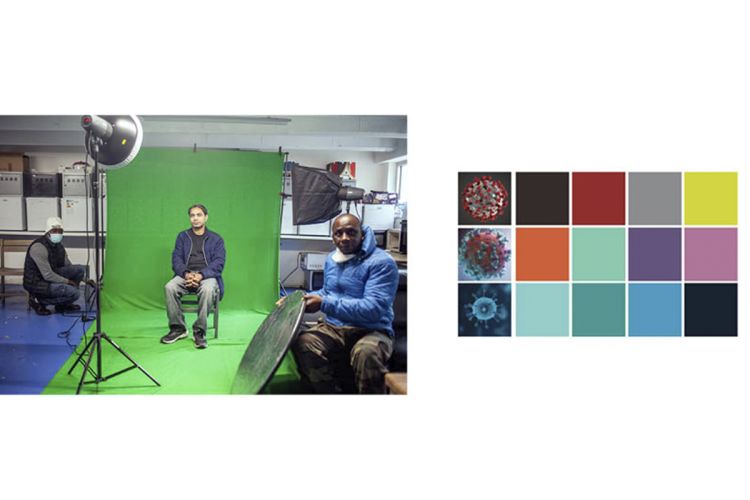

A photo studio with a Chroma background has been set up for those who want to join their loved one for a photo. I also do in situ private portraits that will be inserted into archived photos taken from the participants’ cell phones or drawers. The treatment of color gives the photographic inlay a poetic touch that transcends the collage and moves away from the archival image.
The creation of a pantone from images of the Covid-19 molecule underlines the context, reframes or even frames the image and the imaginary we have of migrants and undocumented migrants.
The chroma invites escape, the inclusion of archived photos with the portraits brings realities closer together from the intimacy and provides us with valuable information about the identity and feelings of these people often invisible from public space. It generates a feeling of empathy. -
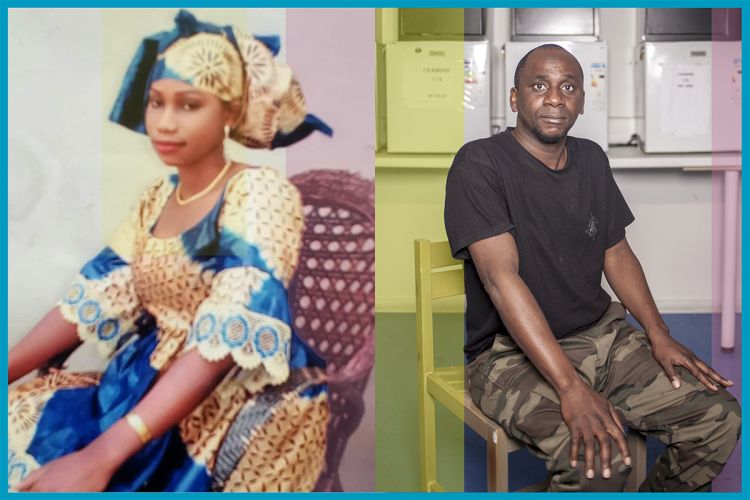

A pantone color coincides with that of the CHU premises, curtains. This is the Couleur Chartreuse, synonyms of bad reputation, travel, illness and hope. Thus, the frame acquires a force that moves away from the drama the confinement has left in society. We mark an emotional stop that helps us reflect on the experiences of the people photographed in a moment so conducive to introspection. Yahya Fane arrived in Paris from Abidjan on December 3, 2019. He hit the road after repudiating his wife, Afou, to whom his parents forcibly married him. Yahya stopped talking with his family except with his 17-year-old little sister Balima with whom he feels very close.
Since the lockdown, Yahya spends most of his time in the common living space, running away from the 4 walls of the room he is sharing with 5 other isolated men. -
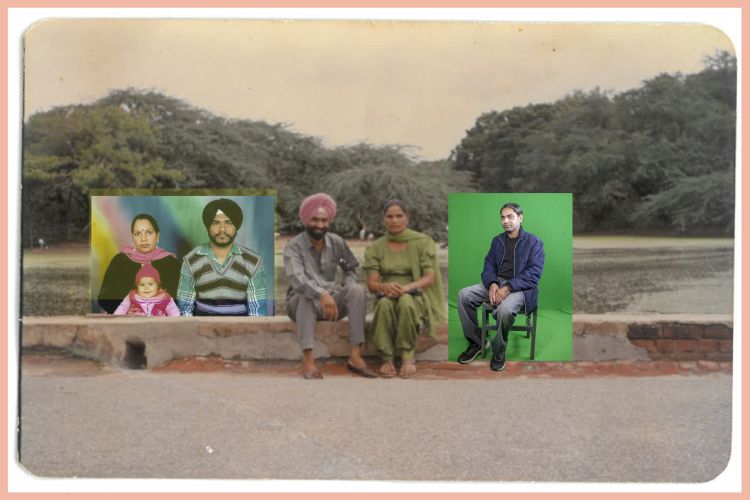

The manipulation of the image is intended to generate critical thinking in the service of solidarity with this collective often “stared at” in the media.
Salwinder Singh was born in India in 1973. Coming from a farmer family, he is the only one of the three children who did not complete his education following the untimely death of his father. As a young man, he decided to take another path : Europe in 2003. After several years living in the street, he joined an emergency accommodation system a few months ago, following a recent hospitalization due to his alcoholism. Since the lockdown started, Mr Singh has regained his self-con dence and has succeeded in controlling his addictions. In this photograph, Mr Singh reconnects with his family, whom he has not seen for 17 years now. -
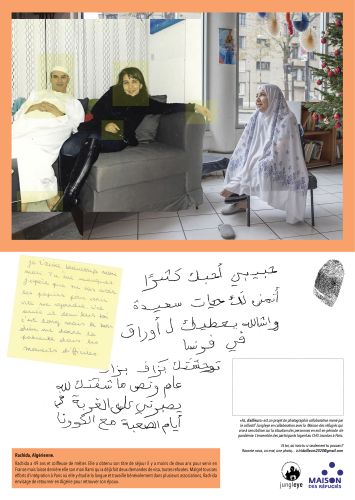

Exemple of Postcard
Rachida, Algerian, is 49 years old. She is a hairdresser by trade. She live in the center since 01/10/19. She share In her room with 5 other women whose exchange gets worse day by day with the confinement. She obtained her residence permit less than two years ago to come to France but leaves behind her husband Rami who has already made two visa applications, all of them refused. Despite all her efforts to integrate into Paris, where she studied the language and worked as a volunteer in several associations, Rachida plans to return to Algeria to find her husband. Rachida relies on religion as a way to overcome her difficulties and believe in a better daily life.
-
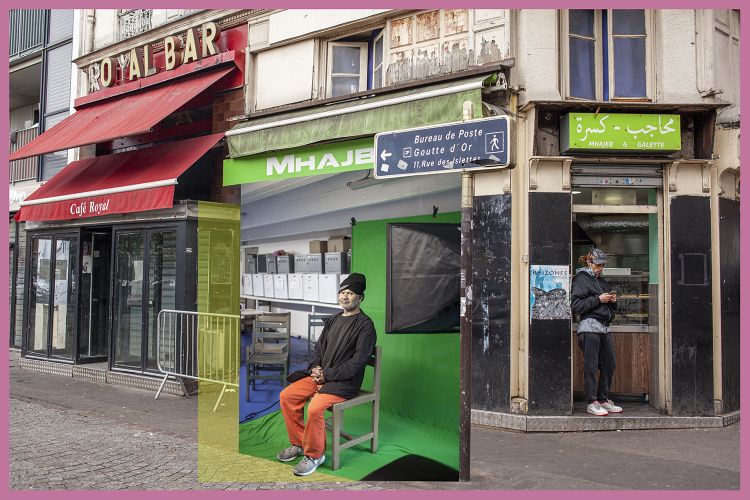

Thangarajah has the status of political refugee in France since 1984. To the question: «If you could leave your 6m2 room, where would you go?» He decides to end the perimeter confinement to join the 18th arrondissement of Paris. Solitary by nature, Thangarajah struggles to adapt and find his feet in French society. When the lockdown started, he lost his landmarks, his favorite places, his street. The refugee house has become its space where interaction with others became a habit. I went to Barbés in his favorite bar to make him his postcard. From these walks I give an account of the situation in Paris.
-
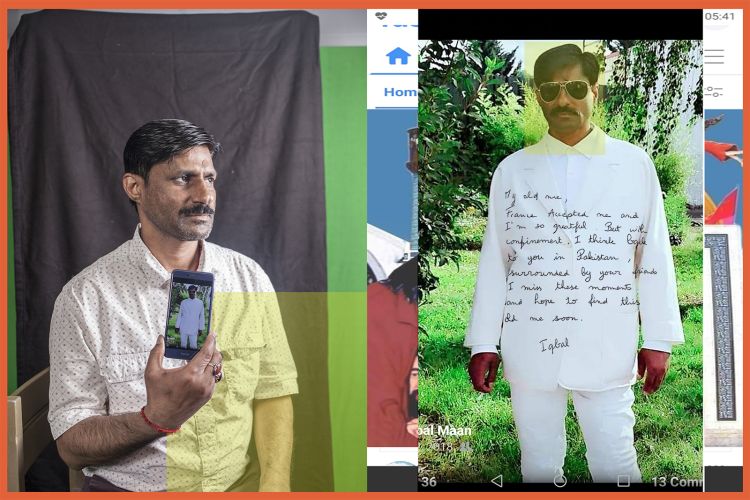

Maan, 40, arrived in France in 2016. He left Pakistan in a hurry after being the victim of an assassination attempt in which he lost the use of his leg. Mr. Maan was a taxi driver. Now disabled for life, he cannot work. Mr. Maan is a “paperless”, he lives in CHU Jourdan and here he dreams of the life that was stolen from him there. On his postcard, he writes to himself. Shocking testimony to the degradation of his mental health.
-
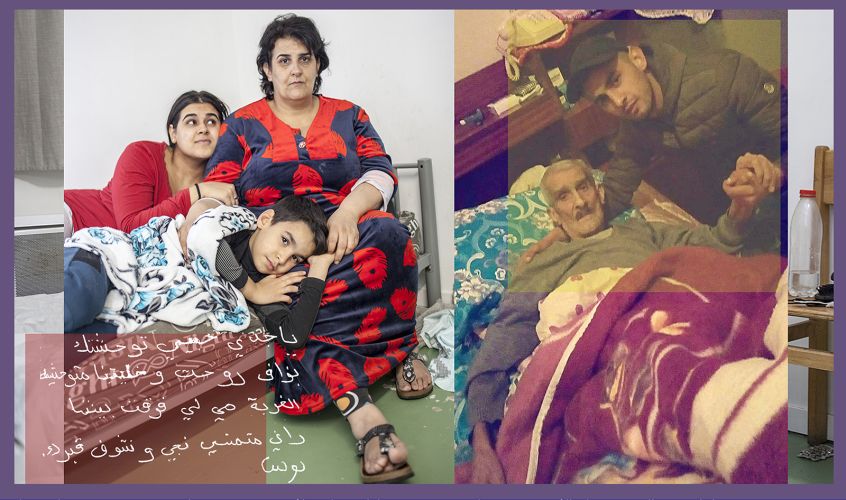

Sherazade arrived in France 3 years ago with her 23 year old son Mahmoud, 11 year old son, Younes and her 16 year old daughter. She left her country and her husband to prevent her daughter from the forced marriage with a much older Algerian man living in Alicante, Spain. A few days before the wedding, Sherazade takes advantage of being on European soil to pick up her children and run away to France. Her decision had an impact on her family, triggering the anger of Sherazade’s father who later condoned his daughter’s act of courage. Sherazade’s biggest regret is that he was unable to say goodbye to his father who died earlier this year. “my grandfather I miss you. I am far from you. You died and I was not by your side. I can’t wait to come back and go to your grave.” in all contexts, not being able to say goodbye to those you love, breaks your heart. Pandemic or not.
-
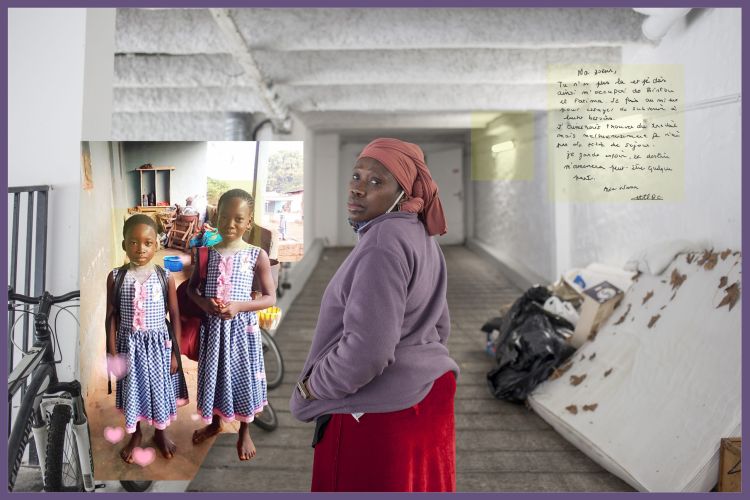

now responsible following the death of her sister.
She did not apply for asylum in France because she knows full well that it will be refused. She lives without papers in Paris. She likes to make African headdresses and secretly dreams that, one day, it will be exhibited in the hairdressing salons of Château Rouge. The majority of the residents explain their fear of going out in Paris during the time that is allowed to them because of being more visible. On the Parisian streets empty of its inhabitants, they become the target of police checks. -
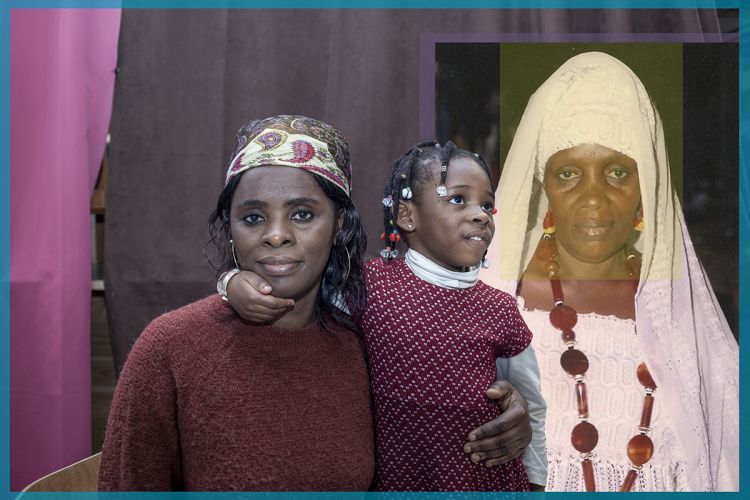

Makeme is a 35 year-old women from Ivory Coast. Single mother, she stays in a social hotel with her 5 year-old daughter. She suffers from anxiety related to the pandemic situation.
Thanks to a «family reunification», we work on her concerns about never seeing her mother again. Her postcard was sent to Abidjan to her mother.
“my sweet mother, this disease worries me. I’m afraid I’ll never see you again. I want to express my gratitude and my infinite respect to you. I remember when we were kids, the miles you used to drive home to eat. I would try to be as brave as you so that Akilah misses nothing. Thank you mom for never giving up on me.” -
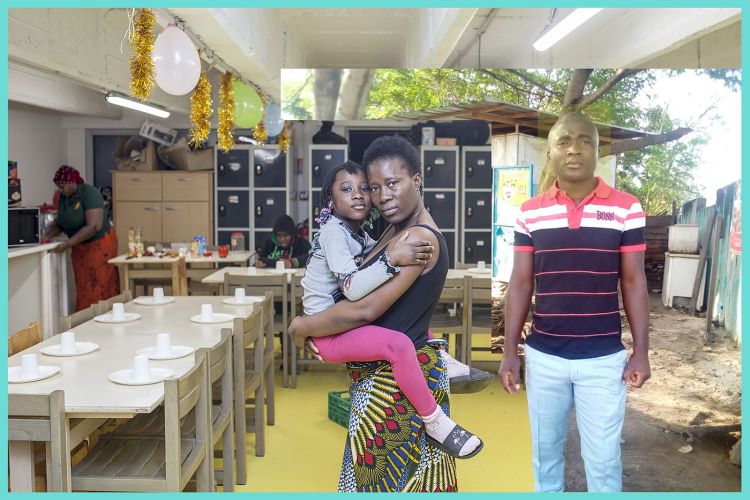

Helped by the father of her 4-year-old daughter Ferielle, Khadijah left Côte d’Ivoire in January 2019. She ed to protect her daughter from excision, a compulsory practice in her family. After several months on the street in Paris, lugged to the right and to the left using the 115, they succeeded last August in integrating the CHU after giving birth to a little boy. “Exaucé”, was born from these months of hardship. Khadijah is gradually rebuilding herself at CHU Jourdan alongside her two children with the support of her roommates with similar fates. Through her postcard, she decides to thank Roland, Ferielle’s dad. Message: Roland, thank you for helping me escape the country. Ferielle is no longer in danger. Everything will be fine for us. We are thinking about you. Khadi.
-
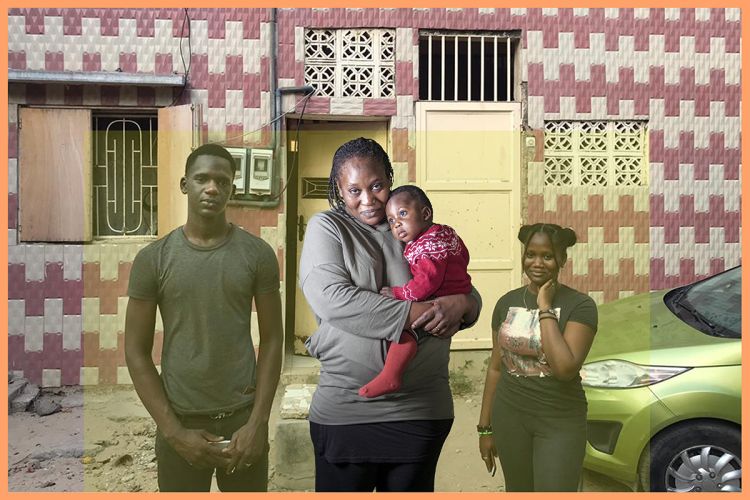

Aissatou wish to y away alongside her children, Alun and Yvonne, to mourn the death of the grandmother caring for them in the country since she left Senegal. They never met their 9-month-old baby brother, Mohammed. Aissatou cannot return to Senegal because her husband, to whom she was married at the age of 13, threatens her to claim her last son; born from sin, under the rights of forced marriage. Aïssatou fled Senegal in 2018 without being able to divorce her torturer. She lives in Paris in an irregular situation.
-
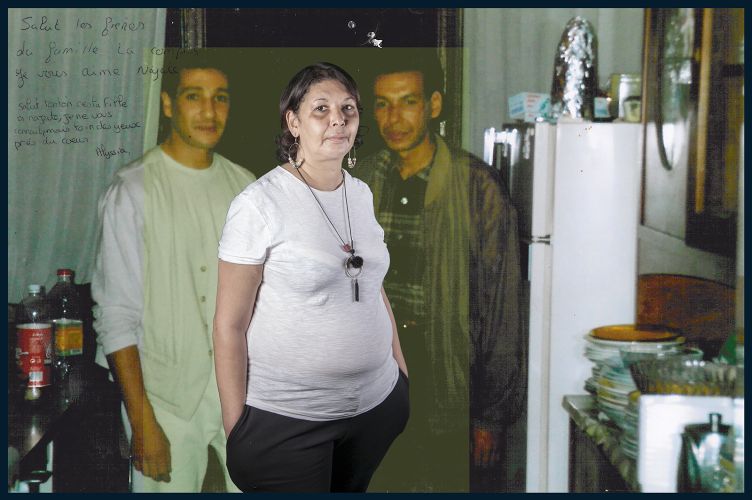

Najate has 47. She is a separated mother of 2 children and has lived alone in the CHUs of Paris for 5 years now. She wish to be taken in hand in a specialized clinic to put an end to her addictions. At this invitation to escape, she chooses to reunite with her brothers, who remained in Morocco. Both Muslims, don’t accept her situation as a woman. This postcard was written with her daughter present alongside her mother to accompany her in this process of creation and repair.
-
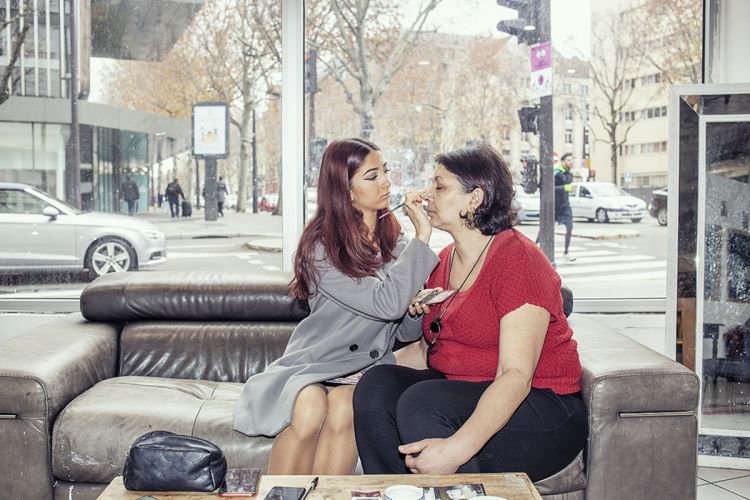

Najata takes advantage of her daughter’s visit to have her make up done at our photo shoot. Five days after this photo, Najate will once again be expelled from the chu for brawling with her roommates. The complexity for “paperless homeless” people thee is to live with pre-established schedules in an organized framework and structure. She suffer difficulties in coping with her addictions. Due to the pandemic, visits are restricted. Najat also suffers from being deprived of the person she loves most and with whom she manages to self-manage.
Portrait taken in the hall of the Maison des Réfugiés. -
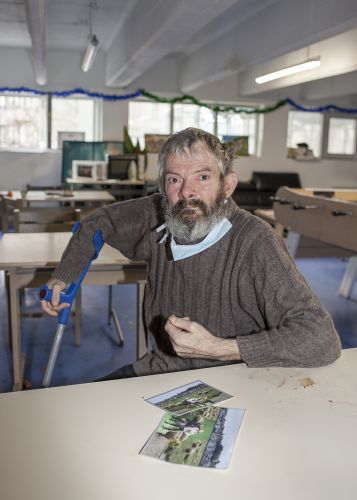

Claude is 60, he comes from remote lands in the North of France. He used to be a butcher and a football referee. After being red 11 years ago, he decided to come to Paris for a new start but he ended up in the street. Since the lockdown started and with his companions at the emergency accommodation center of Jourdan, Claude, nostalgic, dreams of returning to his hometown. upon receipt of his postcard, Claude is moved. The workshop had a positive impact on the participants and on »La Maison des Réfugiés». The users of the Refugee House have reinvested the spaces and imbued them with their testimonies. This project symbolizes the need for culture as an act essential to our individual existence and collective. After the success of my initiative and taking into consideration the possibility of organizing activites and respecting the sanotary measures, the center opened again its doors and organized Yoga sessions and sewing workshops as they used to do before the lockdown.
-
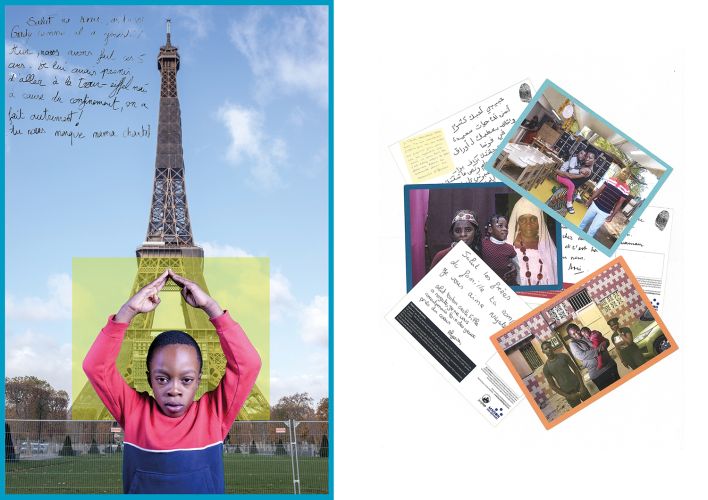

Left. Grady was born in Paris five years ago. His mother, Gisèle, left from Congo before giving birth. Since then, they have been placed in several emergency accommodation centres, here and there in the suburbs of Paris. Today, they found a place in the emergency centre Jourdan, they will stay here the time of the lockdown. Gisele still undocumented. Grady asked us for a picture with the Eiffel Tower that he has never seen, even though he seems to be a professional at posing! I went to shoot the Tour Eiffel, which seems confined to the image of the critical situation of the cultural sector in France. I am grateful to have been able, despite the limitations, to do this project with complete freedom and find a way to make the invisible visible with postcards. ADDRESSEE OF MY POSTCARD : My mom wrote to my aunt Chantal, she lives in Brussels.” hi sister, did you see how Grady grew up? yesterday we celebrated its 5 years. I had promised him to go see the Eiffel Tower but with confinement, we did otherwise. We miss you mama Chantal”
Right. I created 17 uniques postcards during this 10 days i get the access to the place and 1750 was printed by “La maison des réfugiés” as awareness tools for their disseminations during the International migrants days on 18.12.20. With these public actions, I make a “gesture” against those “barriers” imposed. Design postcards done with Julie Brun and the postproduction with Pepe Molina.
-
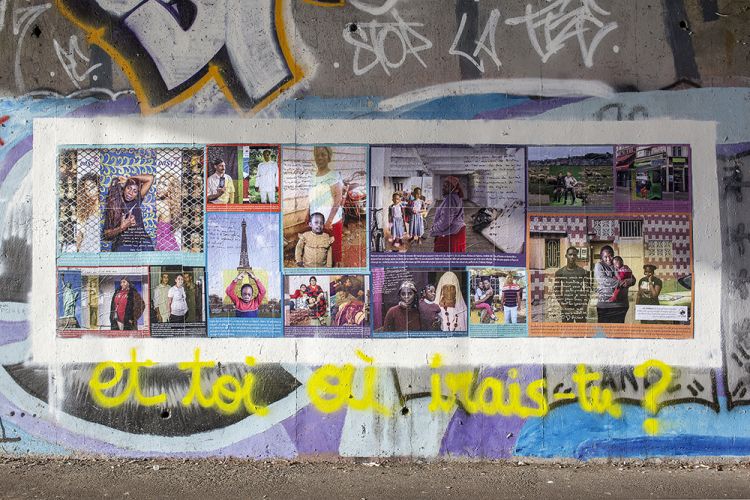

18.12 International Migrants Day. On this occasion, the 17 postcards produced during the workshop were printed in 1750 copies by the «Refugee House». Becoming awareness-raising tools, hundreds of postcards were sent to Parisians and local elected officials to initiate a dialogue on the guarantee of the rights of exiled people.
Echoing this initiative, with my partner in crime Julie Brun, we exhibited these 17 unique postcards in large formats in the streets of the hyper- center of Marseille and Nantes. Free-standing billboards have become the medium of this free and self- produced exhibition in the eyes of many passers-by.
Mural that I made in Nantes on 17.12.20. This project allowed me to breathe while allowing others to breathe. To the question, where would you go if you could? I would have answer anywhere. I was in the right place, there. I took the opportunity of the exceptional access that was granted to me to set up the first artistic & cultural activity since March 2020. -
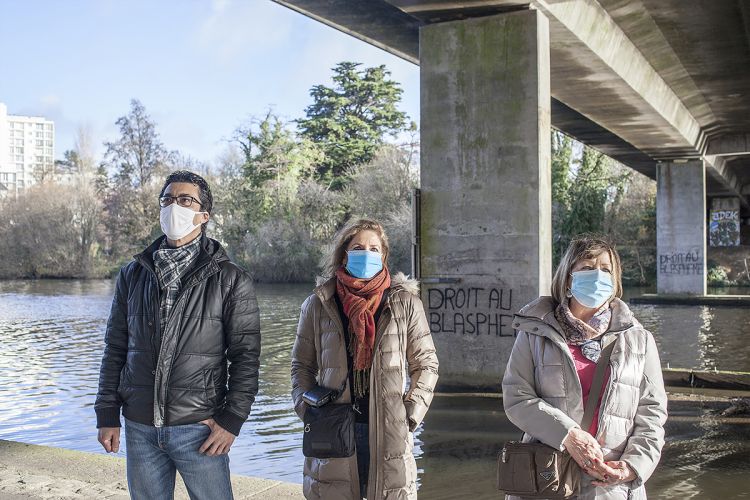

Walkers stop at our exhibition, in exchange they will leave with two postcards, one for them, one to send to make the stories travel.
In these times of pandemic during which culture is becoming inaccessible, we resist the closure of museums, exhibition halls and all cultural places by appropriating public space and bringing culture to the streets.
Ici, d’ailleurs
The town of Paris went into lockdown again on October 30th, along with the rest of France. From November 12 to December 12, 2020, I have requested and been granted permission to join the “Maison des Réfugiés” to meet the inhabitants of the emergency accommodation center Jourdan located on the same building, in Paris. In total, 280 people reside there. These center host, guide and shelter people from the street, isolated men and women, most often individuals damaged by the harshness of life “outside”.
I first focus on a reportage on how the re-confinement is experienced in this place and finally conclude that effectively the overall difficulty of respecting the hygiene and physical distancing measures decreed by the national protocol. A question arises: given the smallness of the place, how do you respect social distancing when you live with 280 people and have to share a common bathroom and kitchen?
In conclusion, this health crisis reveals difficult living conditions and a lack of resources which are not new and which in reality only underscore the failure of the reception system in France for years. I decided to reinvent myself to develop a collaborative project in the service of awareness.
The pandemic and the confinement imposed on us all isolate us from our social ties and prevent us from moving and living freely. This situation, which is exceptional for us, raises our awareness of the reality of exiles, undocumented migrants, asylum seekers, forced to move away (geographic, social and family), to restricted and controlled circulation. I am interested in this vital moment when the gazes become horizontal.
We all dream, whatever our origins, of exodus, once our freedom of movement is limited to an imposed perimeter. On Christmas Eve and in a context where the entire population suffers from uncertainty about the possibility of meeting with their family for the holidays, I underline the permanent impossibility for the exiles to be with their loved ones.
Project supported by Emmaüs Solidarité.
-
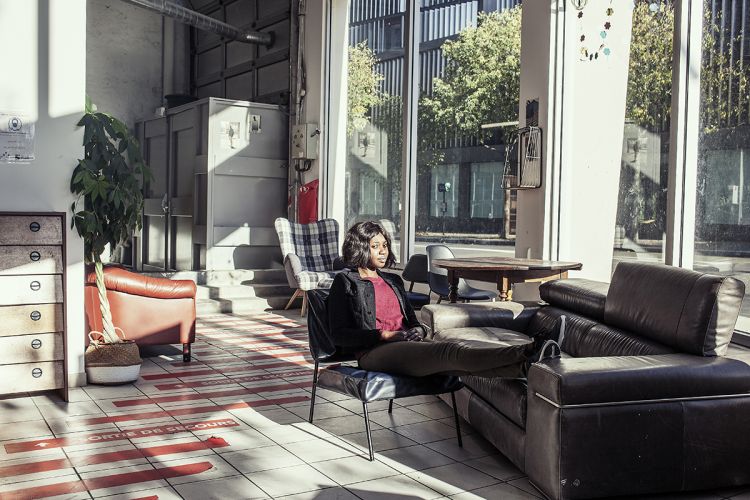

Alimatou, Senegalese and resident to the CHU, poses at the hall of “La maison des réfugiés” at my arrival. Her situation is regulated administratively speaking. She is confident in the future. She live in France for 3 years and reminds me that she didn’t need the pandemic to have been previously confined for several months due to European migration policies. Now she lives at the CHU since thirteen months because she doesn’t have enough money to pay rent and less to visit her family she misses greatly. Fortunately, social networks have evolved in recent years. The distances are getting shorter. At this point, I understand that we, citizens, have a hard time living this situation. Our confinement today is usually theirs. talking with Alimatou confirms my choice to work on the link at a time of imposed distancing.
-
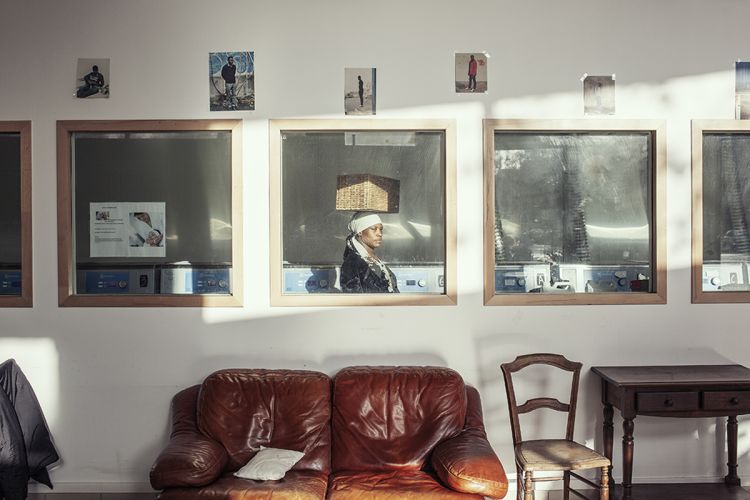

Portrait of Tata Bamba, ivorian, at the laundromat which is located in the same place as the “Refugee House”. It is a place of meeting and perpetual tension for all the inhabitants of the CHU due to waiting lines and material lack. Tata is 6 and a half months pregnant with a little girl whom she will call Yasmine as her mother who died 5 years ago, the year of her arrival in France with her 3 children and husband. Tata has difficulty adapting to life in France and more precisely in the centre where she has been living for 1 year and 8 months since its opening.
-
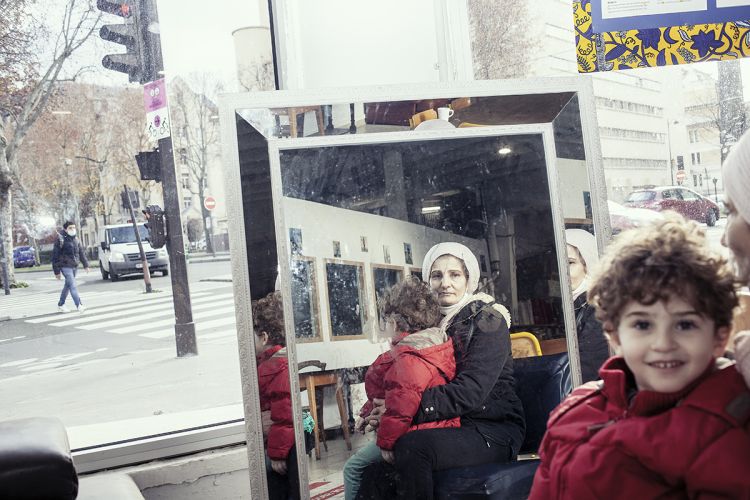

Ourida, Algerian, has been living at the CHU for 8 months with her three children. I met her in the hall of the “Maison des réfugiés” when she came black with Medhi, 3 years old, from the school. He will finally go to school for the first time, 2 days later. Ourida has been separated for 3 years, comes here to heal her head and live peacefully with her children. She suffer family pressure from his in-laws. Ourida is Kabyle, she was cradled in the principles of freedom and respect. My mother is cool” she told to me, “This center is not heaven, we are here to heal our heads. That’s all”. Ourida is appeased to know Medhi outside the center for a few hours a day, far from the surrounding tension. 138 children are living in the Center.
-
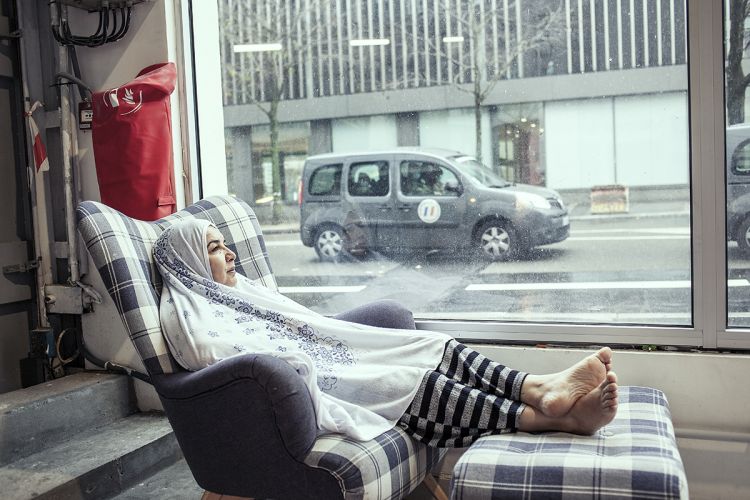

Affected by the restrictions due to the pandemic, the “Maison des Réfugiés” is on stand-by, the spaces are empty and activities suspended. Rachida, affected by the lack of socialization, wonders about the reasons for her coming to Europe. Her visa expires soon. Portrait taken in the hall of the “Maison des Réfugiés” while a vigipirate car passes. The usually complexity for undocumented migrants to come out is increased in this pandemic situation and from the Vigipirate plan in “emergency attack”.
Feedback of Rachida. The “Here elsewhere” project made it possible to re-manifest the link between people in a period that in inflicted withdrawal. -
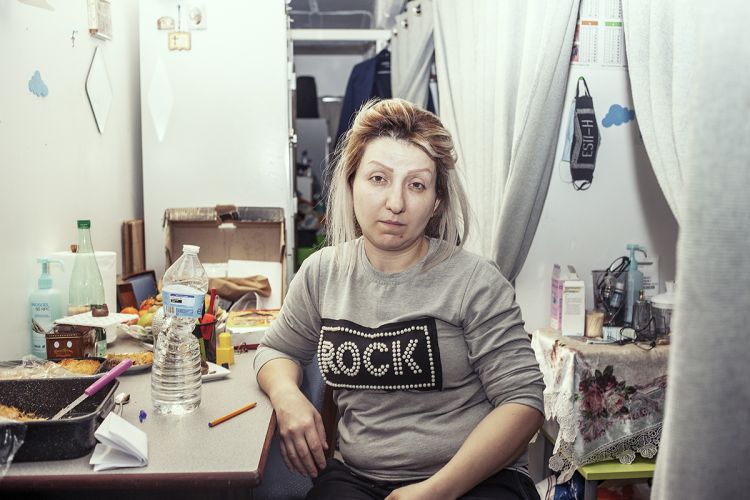

Satik Knarik is Armenian. She has been living at the center for 8 months with her 3 children, her mother and her husband. The confinement directly affects her couple. Of jealous nature, her husband refuses to let her pass through the living spaces of the center. Everything is conducive to conflict. She suffocates from the lack of space and intimacy. Portrait taken in her room, chambre 218 while she tells me the reasons for her recent abortion. “This is not a place where a family can grow.”
-
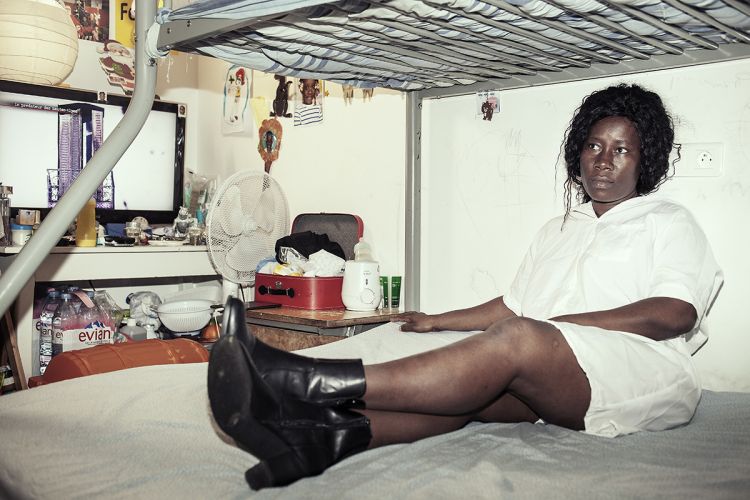

Helped by the father of her 4-year-old daughter Ferielle, Khadijah left Côte d’Ivoire in January 2019. She fled to protect her daughter from excision, a compulsory practice in her family. After several months on the street in Paris, lugged to the right and to the left using the 115, they succeeded last August in integrating the CHU after giving birth to a little boy. “Exaucé”, was born from these months of hardship. Khadijah asked me for a portrait to send to her ex, Roland. She put on the dress he had bought for her before she fled Abidjan. Khadijah is gradually rebuilding herself at CHU Jourdan alongside her two children with the support of her roommates with similar fates. Portrait taken in her room, chambre 314.
-
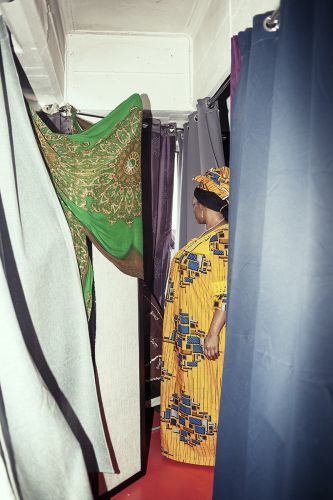

Room 123 of the CHU Jourdan. Five isolates women are living there. One of them is Madame Coulibaly from Senegal. I photograph her when she comes out of her room, which does not respect the 9 m2 stipulated by law as criteria for decent housing. She tell me, she is part of the decor. Here there is no furniture, just curtains of fabrics which enclose us even more on ourselves. In this condition, it’s difficult to project oneself but also to respect the social distances imposed. “Everything is fabric”.
-
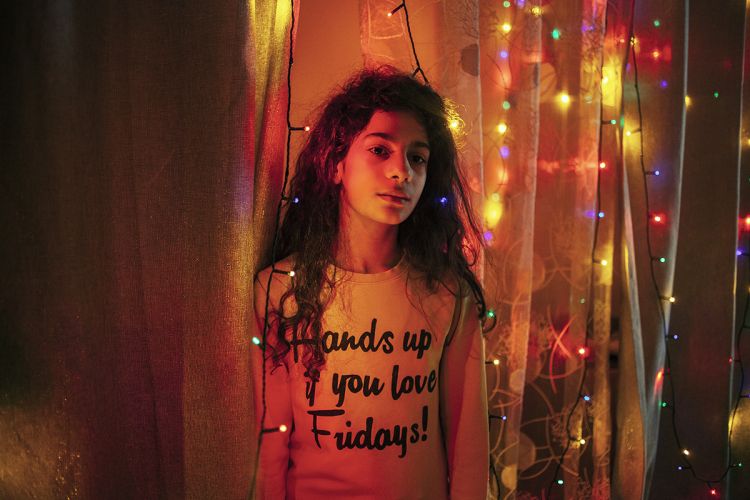

Mariem is Georgian. She lives with her family, her parents and her two sisters in the shelter for over a year. Her mother calls me to do a portrait because on December 15th, 3 days after, she will celebrate her 11th birthday. Meriem doesn’t want people to see where she lives. She prefers to imagine herself elsewhere, far away. For the children, the fact of remaining in school during this new period of confinement allows them to distance themselves from tensions due to the typology of this place but the teenagers are bored in the center, all the more so as the “Maison des réfugiés”, which offered ample activities for young people, is closed for the moment. Portrait taken in her room, chambre 219. We play withChristmas decoration but her gaze remains lost.
-
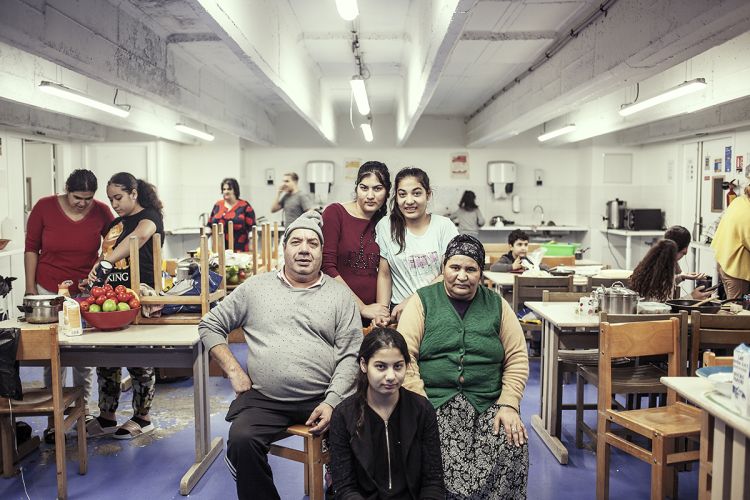

Portrait of the family Ibram from Roumanie taken in the common living space reserved for families on the second floor of the center. The limitation of all movement in the collective spaces of the center and the respect of the social distance is impossible to maintain. For M. Ibram, the complexity of the confinement is to deal live with pre-established schedules in an organized framework and structure. The family that lives on begging is directly affected by the pandemic. Their tourism-related workplaces are closed and their paperless situation does not allow them to take the risk of trying to work. The majority of the residents explain their fear of going out in Paris during the time that is allowed to them because of being more visible. On the Parisian streets empty of its inhabitants, they become the target of police checks.
-
